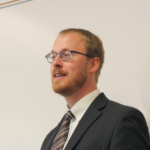For Gregory of Nyssa, man desires to see God, because he is made for God. The faith that this desire for God can be fulfilled is part of a long tradition in the history of the Church and serves as a key with which to read and select writings of the Fathers. In this seminar, we will start by focusing on Gregory of Nyssa’s understanding of the beatific state as developed in his seminal text The Making of Man. Instead of a statement simply about possible future events, the beatific vision for Gregory implies a comprehensive theological anthropology that is well worth considering for our times, for example in light of John Paul II’s thought on the relationship between faith and reason. Against an ancient kind of Arian rationalism, Gregory upheld the enduring positivity of faith, necessitated by the enduring distance between God and man as uncreated and created being. Paradoxically, their ontological distinction becomes for Gregory the very means for man’s unification with God, which he sees as a continual process that opens up and stretches out into man’s infinite capacity for God. In this seminar, we will tackle questions such as what relation the final state of the human being has with its beginnings, how reason relates to faith, how grace relates to nature, and how ultimate fulfilment is understood in the Christian tradition.
Selected Texts
Gregory of Nazianzus, On God and Christ: The Five Theological Orations and Two Letters to Cledonius.
Gregory of Nyssa, The Life of Moses.
Gregory of Nyssa, The Lord’s Prayer, The Beatitudes.
Faculty

Jonathan Bieler
Assistant Professor of Patrology and Systematic Theology
Dr. Bieler received his doctoral degree in theology at the University of Zürich (2017), with a dissertation in Patristics on the coherence of Maximus the Confessor’s thought, which is published by Brill (2019). He taught in the theological faculty at the University of Zürich and assisted the chair of Patristics with teaching and research. In his work, he strives to combine the usage of historical-critical methods with faithfulness to the Church’s living tradition.
Learn More